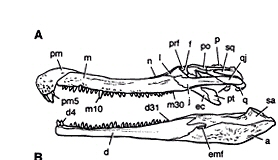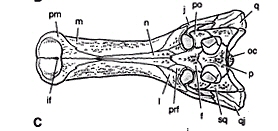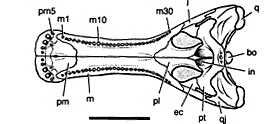civ2 said:
Souron
There are things that are too well-known to be considered falsificable.
And there are things that can't be checked - such things MUST be considered falsificable.
The only things that cannot be checked are those things that do not interact with anything that we interact. For example, if something exists trillions of light years away, and the univerce is only a few billion year old, then that thing cannot be checked. There is also an "Uncertainty Principle" that prevents some natural phenomina from being fully described.
Everything else leaves a mark on the world. And we can observe that mark.
Now sometimes we have to guess what made that mark. For example if there is a bloody handprint on a wall we can assume that it was made by a human. Is there 100% proof that it was made by a human? no, it could have been made by a vulcan who beamed in, left a handprint, and beamed out. But surely that is not the best explanation. That's what paleantology seaks to do, find the most likely explanations for handprints, footprints, and even bones found in the earth.
Also - a fact is an event that really took place and there are witnesses of it.
So if I kill somebody in my own house, with no wittnesses, it'd didn't really happen because there are no wittnesses.
If a tree falls in the forest and nobody is there, does it make a sound? Of course it does.
"Theories and "laws" can't be facts because they do not mean events.
The "theory of gravity" is not a fact - Newton's apple (and any similar falling objects) is a fact.
You an rely on facts (at least you can prove/disprove them) - but you can't rely on theories.
You have an interesting definition of a fact. So according to you a fact is an event that happened. A law is an event that tends to happen. And a theory is something that explains the facts and laws, answering the question "Why?".
How do you prove that Newton whatched an apple fall from a tree? or was it that it hit him on the head?
That's not a very verifiable fact, is it?
The world works in exactly one way. That is there is only one right way to describe it. Either evolution is right or some alternative theory is right. Science has a method for determining which of to theories is right. Back to the bloody handprint example: It is possible to discount the possibility that vulcans beamed in and left the hand print, because there has never been any other example of vulcans existing exept is Star Treck. Simmilarly science discounts convoluted theories that are convoluted when there is a much simpler explanation of things.
The number of guys "creating and proving" a theory has no significanse.
I agree, exept that a experiments are supposed to be repeatable. So the more people repeat experiments proposed by a theory and get positive results, the more likely the theory is true.
Furthermore, a mass of people is not likely to conspire, but a sometimes individuals do lie, or fudge results to better suit there data.
But this is not really relivant to evolution. Evolution has a lot of supporters, and there isn't a single qualified scientist argueing against it on scientific grounds.
It's much like we see in the US courts where 12 people must make a decision.
But it's obvious that most of them are not capable of judging REALLY unbias.
That's the human nature - to be bias.
And in both cases the biased mind makes all it takes to "prove" something he/she wants to "prove".[/QUOTE]









 ) which basically states that everything is completetly different from everything else, and that no rules can be applied. YOu can see how far that got people.
) which basically states that everything is completetly different from everything else, and that no rules can be applied. YOu can see how far that got people. 